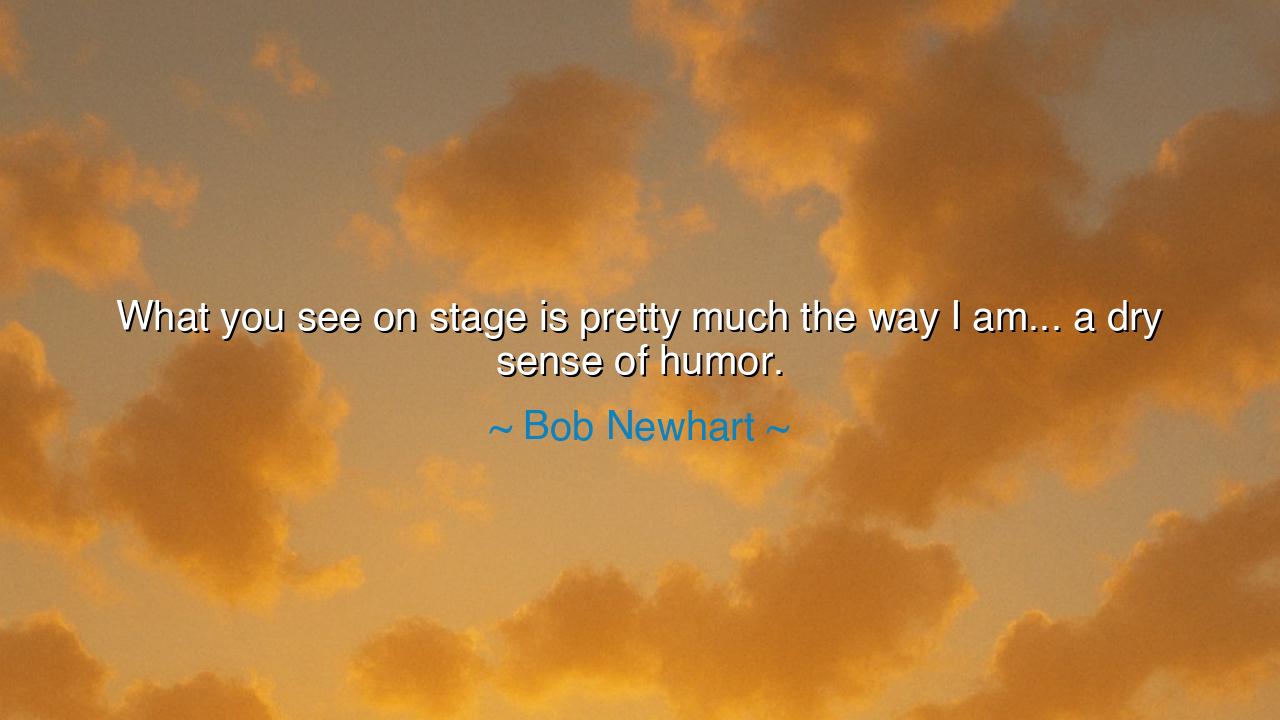
What you see on stage is pretty much the way I am... a dry sense






In the grand tapestry of life, where all who walk the earth are given the opportunity to express their truths, there exists a form of humor that does not demand the spotlight but instead rests quietly in the heart of the one who embodies it. It is dry humor, a wit not loud and boisterous, but subtle, restrained, and deeply insightful. The great Bob Newhart once spoke of this very truth: "What you see on stage is pretty much the way I am... a dry sense of humor." With this statement, Newhart did not merely describe a comedic style; he revealed a profound philosophy of authenticity, of embracing one’s true self without the need for embellishment or pretense. What you see in his comedy is not a performance of another, but a glimpse into his very soul—a soul that understands the beauty of quiet wit.
In the ancient teachings, wisdom was often passed down not through grand speeches, but through the quiet, subtle expressions that reflected the deeper nature of the universe. Socrates, the philosopher of ancient Athens, did not speak with grandiosity, nor did he seek to draw attention to his own intellect. He simply asked questions, inviting his followers into a conversation that often revealed more than any speech could. His humor was dry—an irony so sharp that it made the world around him appear both absurd and enlightening. Bob Newhart's style mirrors this ancient wisdom: not through exaggerated gestures or overwhelming displays, but through quiet reflection on life’s complexities. Both Socrates and Newhart teach us that true understanding often comes not in the loudest moments, but in the understated recognition of truth that speaks softly but profoundly.
In the same manner, the great Stoic philosopher Marcus Aurelius lived a life full of profound insight, but his wisdom was rarely spoken with loud proclamations. Rather, his Meditations were written reflections on the nature of the soul, the fleetingness of life, and the folly of human pride. Within these texts, one can sense a quiet, dry humor—not mocking, but gently acknowledging the contradictions and imperfections inherent in human nature. Marcus Aurelius found the humor in life’s absurdities, just as Newhart does, revealing that there is profound insight in restraint, in holding back the dramatic for the sake of the truth that exists beneath the surface. It is through such subtlety that both men reveal the deepest wisdom, for humor—when not over-exaggerated—can illuminate the very heart of the human experience.
Let us now look to the stories of those who walked before us, who lived in the light of this wisdom. Diogenes, the philosopher who lived in a barrel, was a master of such humor. His actions, though at times seemingly absurd, were full of profound meaning. When asked what he was looking for, Diogenes replied, "A man." His humor was dry, his insights sharp. Like Newhart, he did not need to shout his wisdom from the rooftops—he simply let the absurdity of the world speak for itself. Through dry humor, Diogenes and Newhart invite us to see life not as a grand spectacle, but as a series of moments of clarity and truth that speak louder than the most elaborate performance.
In Newhart’s work, we find the very same principle. He does not seek to entertain through the use of exaggerated emotions or situations. Instead, he invites us into a conversation, one in which we recognize the world’s contradictions and laugh at the absurdity of it all. His dry humor is a reminder that the most powerful truths do not need to be yelled from the stage. Humor, when it is quiet and true, offers something far more valuable than laughter—it offers clarity, a moment of understanding that transcends words.
So, we must ask ourselves: how do we embrace this dry humor in our own lives? In a world full of noise and spectacle, how do we maintain a sense of authenticity, as Newhart does? The answer lies in restraint and awareness. Just as the ancient philosophers used irony to reveal deeper truths about human nature, we must also learn to find humor in the subtle moments of our lives—the contradictions, the misunderstandings, the simple absurdities. We need not seek loud applause or external validation. Like Newhart, we can find strength in being authentic, in letting our true selves emerge without the need to perform for others.
In the end, let us follow the wisdom of the ancients and of Newhart. Let us practice dry humor, not as a performance, but as a way of being. Let us find joy in the quiet reflections of life, in the small, understated moments that reveal the most profound truths. In doing so, we do not simply entertain; we invite others into a deeper understanding of the world, a world that is often more humorous in its contradictions than we realize. And in that humor, we may find our truest self.






AAdministratorAdministrator
Welcome, honored guests. Please leave a comment, we will respond soon